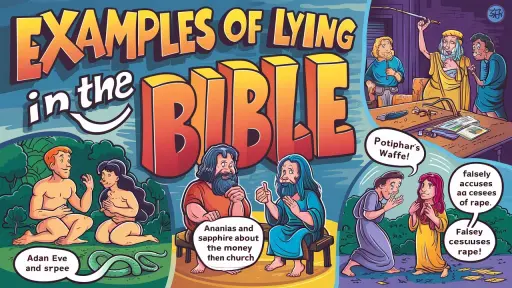Have you ever wondered if biblical figures were capable of resorting to lying?
Are you curious about the complexities of truth and deception within scripture?
Prepare to be intrigued as we delve into ten instances where truth was manipulated and lies were told in the Bible.
Lying Bible Quotes Generator
Use this tool to explore significant examples of lying in the Bible, understand the consequences, and learn from biblical narratives that address deceit. Click the buttons below to generate key Bible verses, affirmations about truthfulness, and insightful facts about the impact of lying as described in scripture. This tool will guide you through the many accounts of lies in the Bible, including stories of characters like Abraham, Sarah, Jacob, and Ananias and Sapphira.
In this article, we will explore the stories of biblical characters who found themselves resorting to dishonesty – from the serpent’s deceit in the Garden of Eden to Peter’s denial of Jesus. We will examine the consequences of these lies and how they reflect the challenges and flaws of human nature.
Make Sure You Watch My Video: I would love for you to subscribe to my YouTube channel as well…
The Serpent’s Deception (Genesis 3:1-5)
In the book of Genesis, we encounter the infamous serpent’s deception, which is a pivotal event in the narrative of the fall of humanity. This deceptive encounter takes place in the Garden of Eden, where Adam and Eve dwell in harmony with God.
The serpent, crafty and cunning, approaches Eve and engages her in conversation, planting seeds of doubt and manipulation. With persuasive words, the serpent questions God’s commandment not to eat from the tree of knowledge of good and evil.

“Did God really say, ‘You must not eat from any tree in the garden’?”
The serpent’s artful deception continues as he feeds Eve a distorted narrative, contradicting God’s warning about the consequences of eating from the forbidden tree:
“You will not certainly die,” the serpent asserts confidently. “For God knows that when you eat from it your eyes will be opened, and you will be like God, knowing good and evil.
This cunning deception lures Eve into questioning God’s intention and wisdom, ultimately leading to her decision to eat the forbidden fruit. Tragically, Eve convinces Adam to do the same, and their disobedience results in the entry of sin into the world.

The consequences of this act resonate throughout human history, shaping the unfolding narrative of sin and redemption. The serpent’s deception serves as a poignant reminder of the pervasive nature of lies and the dire consequences they can bring.
Sarah Denies Laughing (Genesis 18:12-15)
In the book of Genesis, we encounter a remarkable story that reveals the vulnerability of even the most revered biblical figures. Sarah, the wife of Abraham, demonstrates the depths of human disbelief and doubt in God’s promise of a son.
In Genesis 18:12-15, Sarah overhears a conversation between Abraham and three heavenly visitors. They inform Abraham that he and Sarah will have a child in their old age. Upon hearing this, Sarah, who is standing at the entrance of the tent, laughs to herself, secretly expressing her skepticism.

It is at this point that the story takes a surprising turn. When the visitors question Abraham about Sarah’s laughter, she denies it, saying, “I did not laugh” (Genesis 18:15, NIV). This instance of dishonesty reflects Sarah’s fear and doubt regarding God’s promise. She is unable to fully believe in the possibility of miraculous conception and resorts to lying to conceal her disbelief.
“I did not laugh,” Sarah replied, because she was afraid. But he said, “Yes, you did laugh.” (Genesis 18:15, NIV)
Sarah’s lie exposes a common human tendency to doubt and fear even when faced with the divine. Despite her subsequent realization that her laughter was known to God, her initial denial highlights the fragility and complexity of faith in the face of extraordinary circumstances.

| Key Points | Details |
|---|---|
| Sarah’s lie | Sarah denies laughing at God’s promise of a son. |
| Disbelief in God’s promise | Sarah’s lie reflects her skepticism and doubt regarding God’s ability to fulfill His promise of a child. |
| Fear and doubt in biblical figures | This story highlights the human tendency to experience fear and doubt, even among revered biblical figures. |
Abraham and Sarah in Egypt (Genesis 12:10-20; Genesis 20:1-18)
In the book of Genesis, we encounter an intriguing story involving Abraham and his wife Sarah during their time in Egypt and later in the land of Gerar. These accounts shed light on Abraham’s lie, Sarah being portrayed as his sister, the underlying fear and lack of trust, and the presence of biblical figures in Egypt and Gerar.
During their stay in Egypt, Abraham, out of fear for his life, claims that Sarah is his sister rather than his wife. This deception is motivated by his belief that the Egyptians would kill him to take Sarah, who was renowned for her beauty. In Genesis 12:14-15, we read:

“When Abram came to Egypt, the Egyptians saw that she was a very beautiful woman. And when Pharaoh’s officials saw her, they praised her to Pharaoh, and she was taken into his palace.”
This incident unfolds similarly in Gerar, where Abraham repeats the same lie to King Abimelek, Sarah catching the attention of the king due to her beauty. In Genesis 20:2, Abraham tells Abimelek:
“She is my sister,” he said. So Abimelek king of Gerar sent for Sarah and took her.”
Abraham’s repeated actions reveal his apprehension and lack of trust in God’s protection. He resorts to deception to safeguard himself, instead of relying on God’s promises and provision. This lack of trust in God’s faithfulness is a reminder of the complexity of faith and human frailty.

It is worth noting that Sarah’s role as Abraham’s sister creates a dangerous situation, as it exposes her to potential harm and exploitation. However, God intervenes and protects Sarah in both instances. The consequences of Abraham’s actions reflect the gravity of his lie, as Pharaoh and Abimelek face divine retribution and direct confrontation from God.
This narrative also exemplifies the presence of biblical figures in Egypt and Gerar, highlighting the interaction between the Hebrew patriarchs and the surrounding cultures. These encounters provide valuable insights into the cultural, social, and historical context of biblical events.
Key Takeaways:
- Abraham lies about Sarah being his sister to protect himself in Egypt and Gerar, driven by fear and a lack of trust in God’s protection.
- Sarah’s portrayal as Abraham’s sister exposes her to potential harm and exploitation.
- God intervenes to protect Sarah and confronts the individuals involved, emphasizing the consequences of deceit.
- The encounters between biblical figures and the cultures of Egypt and Gerar provide valuable insights into the context of the Bible’s narrative.
Isaac and Rebekah in Gerar (Genesis 26:6-11)
In the biblical account, Isaac finds himself facing a familiar predicament when he arrives in Gerar. Just like his father Abraham before him, Isaac resorts to deceit by repeating the same lie about his wife, Rebekah, being his sister.
When the men of the place asked him about his wife, he said, ‘She is my sister,’ for he feared to say, ‘My wife,’ thinking, ‘lest the men of the place should kill me because of Rebekah, because she is attractive in appearance.'” (Genesis 26:7)
This repetition of deception within the family of Abraham underscores the deep-rooted dynamics of fear and deceit that they grappled with. Isaac’s fear for his life leads him to compromise the truth, jeopardizing his relationship with his wife and the consequences it may have on those around him.

Just as with Abraham, Isaac’s lie betrays a lack of faith and dependency on God’s protection. Instead of trusting in the divine provision, Isaac chooses to rely on his own strategies to navigate dangerous situations.
Isaac’s actions in Gerar serve as a reminder that fear and deceit can disrupt family dynamics, eroding trust and straining relationships. This pattern of behavior lingers throughout biblical history, highlighting the complexities and consequences of dishonesty within familial relationships.

To visualize the consequences of Isaac’s repeated lie, consider the following table:
| Isaac and Rebekah in Gerar | Consequences |
|---|---|
| Isaac lies about Rebekah being his sister | Jeopardizes their marital relationship |
| Isaac’s lie puts Rebekah at risk | Potential harm from the men of Gerar |
| Lack of trust between Isaac and Rebekah | Strains their relationship |
| Deception sets a precedent within the family | Fosters a culture of dishonesty |
Isaac’s repetition of Abraham’s lie highlights the destructive power of fear and deceit within family dynamics. By deviating from the truth, relationships become strained, trust erodes, and the consequences ripple through generations.
Jacob Deceives Isaac (Genesis 27)
In this deceitful tale, Jacob, under the guidance of his mother Rebekah, resorts to cunning tactics to obtain the blessing that was meant for his older brother Esau. This incident highlights the presence of deception within family dynamics, as well as the lengths individuals may go to secure their own interests.
“Now therefore, my son, obey my voice according to what I command you. Go now to the flock and bring me two good young goats, so that I may prepare from them a savory dish for your father, such as he loves. Then you shall bring it to your father to eat, so that he may bless you before his death” (Genesis 27:8-10).

Rather than confronting Isaac honestly or accepting his own role as the younger son, Jacob succumbs to deception and uses deceit to manipulate the situation to his advantage. He follows Rebekah’s advice and disguises himself as Esau, even using animal hides to mimic his brother’s hairy body. Through this act of imposture, Jacob gains the patriarchal blessing that was rightfully Esau’s.
“And [Jacob] went to his father, and said, ‘My father.’ And [Isaac] said, ‘Here I am; who are you, my son?’ Jacob said to his father, ‘I am Esau your firstborn. I have done as you told me; now sit up and eat of my game, so that you may bless me'” (Genesis 27:18-19).
This deception not only leads to a fractured relationship between Jacob and Esau but also exposes the complexities and consequences of deceit within familial relationships. The consequences of Jacob’s actions reverberate throughout his life, as he becomes a reluctant participant in further acts of deception, experiencing the devastating effects firsthand.
Through this story of Jacob’s deception, we are reminded of the influence of family dynamics and the potential pitfalls of deceit within those relationships. The consequences of Jacob’s actions serve as a cautionary tale, shedding light on the destructive power of deception and the importance of honesty and trust within families.

| Deception Tactics | Consequences |
|---|---|
| Mimicking Esau’s appearance | Fractured relationship with Esau |
| Impersonating Esau to deceive Isaac | Guilty conscience and inner turmoil |
| Manipulating the situation for personal gain | Loss of trust within the family |
Joseph’s Brothers Lie About His Disappearance (Genesis 37:31-35)
One of the most well-known examples of deception in the Bible is the story of Joseph and his brothers. In Genesis 37:31-35, Joseph’s brothers concoct a plan to deceive their father Jacob, making him believe that Joseph had been killed by a wild animal.
To support their lie, the brothers dip Joseph’s coat in goat’s blood, presenting it as evidence of his demise. This act of deception leads Jacob to believe that his beloved son is dead, causing immense grief and sorrow.
This instance of deception highlights the lengths to which Joseph’s brothers were willing to go to deceive their father. It also demonstrates the power and consequences of lying within familial relationships.
Joseph’s brothers’ lie not only shattered their father’s heart, but it also set in motion a series of events that ultimately leads to Joseph’s rise to power in Egypt.

“They took Joseph’s coat, slaughtered a goat, and dipped the coat in the blood. They showed the long-sleeved coat to their father and said, ‘We found this. Examine it carefully to see if it’s your son’s coat.’ Jacob recognized it and exclaimed, ‘It is indeed my son’s tunic. A wild animal has devoured him. Joseph has surely been torn to pieces!'”
Through their deception, Joseph’s brothers not only caused anguish to their father but also perpetuated a lie that would shape Joseph’s trajectory and influence their own lives in unexpected ways.
Rahab Hides the Spies (Joshua 2:1-7)
In the book of Joshua, there is a captivating story of a woman named Rahab who played a crucial role in protecting the Israelite spies. As the Israelites prepared to enter the city of Jericho, Joshua sent two spies to gather intelligence. These spies sought refuge in Rahab’s house, unbeknownst to the king of Jericho.
Rahab’s lie proved to be a pivotal moment in the narrative, as she deliberately misled the king’s men by stating that the spies had already left the city. Rahab’s quick thinking and deception allowed the spies to remain hidden, securing their safety and fulfilling their mission.
This incident raises profound moral questions about the ethics of lying for a greater good. While lying is generally seen as morally wrong, Rahab’s lie can be seen as an act of courage and righteousness. By protecting the Israelite spies, Rahab demonstrated her loyalty and faith in God’s plan for the Israelites.

“For we have heard how the Lord dried up the water of the Red Sea for you when you came out of Egypt, and what you did to the two kings of the Amorites who were on the other side of the Jordan, Sihon and Og, whom you devoted to destruction. And as soon as we heard it, our hearts melted, and there was no spirit left in any man because of you, for the Lord your God, he is God in the heavens above and on the earth beneath.” – Rahab (Joshua 2:10-11)
Rahab’s lie not only protected the spies but also demonstrated her recognition of God’s power and her desire to align herself with His chosen people. Her actions highlight the complexity of moral choices in extreme circumstances and challenge conventional notions of truth and deception.
The story of Rahab reminds us that there may be situations where lying becomes a moral gray area. While honesty is generally valued, Rahab’s lie serves as a reminder that there can be exceptions when the greater good is at stake. However, it is important to approach such situations with caution and consider the potential consequences of our actions.

The story of Rahab hiding the spies is a thought-provoking example of the morality of lying for a greater good. It challenges us to consider the complexities of truth, deception, and the lengths we may go to protect others. Rahab’s actions remind us that morality is not always black and white, and that there may be situations where lying becomes a justifiable choice.
Ananias and Sapphira Lie to the Holy Spirit (Acts 5:1-11)
In the book of Acts, we find the story of Ananias and Sapphira, who became infamous for their deceptive actions. It all started with a land sale. The couple decided to sell a piece of property and bring the proceeds to the apostles. However, instead of being honest about the full amount, they conspired and agreed to keep back a portion of the money for themselves.
In Acts 5:3-4 (NIV), Peter confronts Ananias, saying, “Ananias, how is it that Satan has so filled your heart that you have lied to the Holy Spirit and have kept for yourself some of the money you received for the land? Didn’t it belong to you before it was sold? And after it was sold, wasn’t the money at your disposal? What made you think of doing such a thing? You have not lied just to human beings but to God.”
This lie and act of deception had severe consequences. As Ananias heard Peter’s words, he fell down dead, struck by God’s judgment for lying to the Holy Spirit. Later, Sapphira, unaware of what happened to her husband, also lied when asked about the amount they received. When confronted by Peter, she, too, fell down dead.

This account serves as a powerful reminder of the consequences of deception and dishonesty, especially when it involves lying to God. It shows that lying to the Holy Spirit is a serious offense that carries divine judgment.
Dishonesty Destroys Trust and Hinders Spiritual Growth
The story of Ananias and Sapphira emphasizes the damaging effects of deception within the early Christian community. Their lie undermined the trust that believers had in one another and hindered the progress of the church. It shattered the unity and authenticity that were vital for the growth of the early Christian movement.
“The lie of Ananias and Sapphira serves as a cautionary tale, reminding us of the importance of truth and integrity in our relationships and endeavors.
Honesty is a fundamental principle in Christianity, and this event highlights the importance of living truthfully and transparently before God and our fellow believers. It reveals that we cannot hide or deceive God, as He knows the secrets of our hearts.

The Consequences of Deception
The story of Ananias and Sapphira illustrates the swift justice of God. Their deaths serve as a stark reminder that God detests deceit and will ultimately judge those who engage in dishonesty. It also demonstrates the seriousness of lying to God, as they attempted to deceive not only the apostles but also the Holy Spirit.
| Consequence of Deception | Description |
|---|---|
| Death as Divine Judgment | Ananias and Sapphira faced the ultimate consequence of their deception, losing their lives as a direct result of their lies. |
| Warning to Others | The swift and severe judgment on Ananias and Sapphira served as a warning to the early Christian community and future generations, reminding them of the gravity of dishonesty. |
| Preservation of Holiness | God’s judgment on Ananias and Sapphira demonstrated His commitment to maintaining the purity and holiness of the early Church. |
This image depicts Ananias and Sapphira’s lie and the divine judgment that followed, serving as a visual representation of the consequences of deception.
Peter Denies Knowing Jesus (Matthew 26:69-75; Mark 14:66-72; Luke 22:54-62; John 18:15-27)
During Jesus’ trial, Peter finds himself in a moment of great fear and uncertainty. As he stands accused of being one of Jesus’ disciples, Peter’s denial sets the stage for a heartbreaking betrayal.
Feeling the weight of the situation, Peter succumbs to fear and attempts to distance himself from Jesus. When confronted by those who recognize him, Peter vehemently denies any association. His words, filled with falsehood, attempt to sever the bonds he has with his beloved teacher.
“I do not know the man!” Peter insists, his heart heavy with both guilt and fear of the consequences.

Peter’s denial unfolds in multiple accounts, as documented by Matthew, Mark, Luke, and John. Each gospel writer provides a unique perspective on this pivotal moment, showcasing the depth of Peter’s fear and the weight it carries.
As the trial progresses and the reality of his actions settles upon him, Peter experiences deep remorse. The weight of his denial becomes unbearable, and he weeps bitterly, realizing the extent of his betrayal.
The Remorseful Repentance of Peter
Peter’s denial of Jesus reveals the complexity of human nature and the frailty of faith in times of intense pressure. In this moment of weakness, Peter’s fear overrides his devotion, leading him to utter falsehoods that will haunt him deeply.

However, it is important to note that Peter’s story does not end with his denial. The subsequent events, including Jesus’ crucifixion and resurrection, bring about a transformative journey for Peter. Through his remorseful repentance, Peter eventually finds redemption and becomes a pillar of strength in the early Christian church.
Peter’s denial serves as a reminder of the human capacity for fear and remorse, highlighting the importance of humility and forgiveness in our spiritual journeys.
How Do the Examples of Lying in the Bible Connect to the Concept of Witnessing?
The Bible contains numerous biblical witnessing examples explored, including stories of deception and lies. These examples serve as cautionary tales, emphasizing the importance of truthful witnessing. The concept of witnessing in the Bible is interconnected with the consequences of dishonesty, urging followers to uphold integrity in their testimonies.
Gehazi Lies to Elisha (2 Kings 5:20-27)
In the biblical account of Gehazi, we witness a cautionary tale of the consequences that arise from obtaining gifts through deception and lying to a trusted mentor. Gehazi, the servant of the prophet Elisha, succumbs to the temptation of greed and resorts to dishonesty to secure personal gain.
When Naaman, the commander of the army of Aram, seeks Elisha’s help to be cured of his leprosy, Elisha instructs him to wash in the Jordan River seven times. Naaman, initially reluctant, follows the instructions and is miraculously healed.

Upon witnessing Naaman’s transformation, Gehazi, enticed by the abundance of gifts offered by Naaman, surreptitiously follows him and fabricates a false account of needing the gifts for two young prophets from the sons of the prophets. However, Elisha, who is divinely aware of Gehazi’s dishonesty, confronts him upon his return, and as a consequence, Gehazi is struck with leprosy.
This cautionary tale serves as a reminder of the inherent dangers and repercussions of obtaining gifts through deception and lying, particularly when it involves betraying the trust of a mentor or spiritual figure. Gehazi’s story underscores the importance of honesty, integrity, and the honorable pursuit of wealth and material possessions.
Call to Action: The Question That Demands an AnswerIn Acts 2:37 Peter and the Apostles were asked the question – What Shall We do? And in Acts 2:38 Peter answered, Repent, and be baptized every one of you in the name of Jesus Christ for the remission of sins, and ye shall receive the gift of the Holy Ghost. For the promise is unto you, and to your children, and to all that are afar off, even as many as the Lord our God shall call. Do you understand this? After hearing the gospel and believing, they asked what should would do. The answer hasn’t changed friend, Peter clearly gave the answer. The question for you today is, Have you receieved the Holy Spirit Since you believed? If you’re ready to take that step, or you want to learn more about what it means to be born again of water and Spirit, visit: Come, and let the Spirit make you new. |





